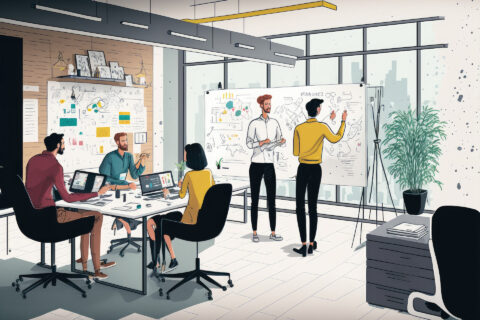Many workplaces have digitized and begun to rely on screens for their daily operations. This transformation has sparked conversations about eye health and the need for tip-top vision. Why is it important to maintain eye health in the workplace? Your vision impacts your safety and that of everyone around you, making it vital in many industries. Here’s a guide on eye health and how it affects daily work activities.
Why it’s critical to maintain eye health at work
Vision is something you might take for granted until it’s no longer there. But without it, it’s hard to remain effective in the workplace. Here are five reasons you should prioritize your eye health for your workplace.
Safety
Safety comes first, whether you work at a desk or on a factory floor. You need solid eye health to safeguard yourself and those around you. Imagine you grab a cup of coffee and walk back to your desk. Poor vision may cause you to miss an object on the ground and trip you, spilling your hot beverage on somebody else. While unintentional, these incidents can bring unwanted and preventable injuries in the workplace.
Eye health is even more critical if you operate heavy machinery. Expensive equipment could become damaged or fail with one accident, compromising your safety and that of your co-workers in the facility. Broken machines could lead to shattered glass or fires, emphasizing why eye protection is important in the workplace.
Protecting others
Vision is integral to occupational health, especially if you have a manual labor job. While you and your colleagues are important, your position may require watching for people outside your facility.
Imagine you drive a truck for a living. Compromised eye health means you’re less able to see other cars, small children and animals on the road. You also have to be vigilant of inanimate objects like trash, shredded tires or puddles of water.
Eye health while driving is essential and it matters even more when you drive a semi-truck. While vans and box trucks cause harm, your typical long-haul truck is more challenging to stop because of its size. Good vision helps you stop your vehicle before the road hazard, helping yourself and those around you.
Productivity
How can you meet deadlines and your professional goals? Your eye health is vital for productivity in the workplace. Imagine you’ve sat at your work desk for four hours, filing reports and participating in meetings. Continuously working behind a screen can strain your eyes and cause headaches. You may find yourself with blurry vision and a reduced ability to focus.
Ultimately, you become a less productive worker. If you’ve felt this way, you’re not alone. Eye health and compromised productivity are global issues as the world loses money annually due to vision loss. A 2021 eClinicalMedicine study finds the global economy loses about $410 billion due to moderate and severe vision impairment (MSVI). The researchers find about 160 million people with MSVI are of the working age, leading to these significant losses.1
Communication
While speaking is important, don’t forget the power of nonverbal communication. Your eyes play a significant role in how you interact with others, whether it’s your colleagues, customers or supervisors. Reduced eye health means you might struggle with eye contact, thus showing disengagement or lacking confidence. Poor vision could also mean misinterpreting what others say, leading to confusion and possible conflict in the workplace.
Nonverbal communication is also essential for meetings and collaboration efforts. For example, suppose you’re in a meeting about product development. Your colleague’s presentation contains charts to point your company in the right direction. If you can’t see these graphs well, you may have difficulty making inferences and suggestions about the next steps. Hence, eye health is necessary for collaborating with colleagues and helping your business grow.
Mental health
Why is it important to maintain eye health? It ties to your mental health, thus affecting your effectiveness in the workplace. You may feel frustrated and less confident performing your routine tasks if you can’t see well. Additionally, your vision could introduce anxiety about those around you and their safety. Reduced self-esteem means you’re not your best while on the clock.
Your eye health indirectly impacts your mental health at work by affecting your sleep. For example, working on your computer at night can strain your eyes and make sleep harder once it’s bedtime. Your body needs a dark environment to produce melatonin, so you could lose sleep at night if your slumber isn’t healthy.
How to protect your eyes
Productivity and safety demonstrate why it is important to maintain your eye health in the workplace. So, how can you safeguard your eyeballs? Here are a few best practices for protecting your eyes.
Regular eye exams
Seeking professional insight on your eyes is an excellent first step. A trip to see an ophthalmologist guides what your body needs for better vision. How often should you see the eye doctor? Experts recommend a complete eye exam at 40, considering your risk for diseases increases. Older adults should have an exam once every couple of years, especially if they already have vision issues or a documented family history of eye problems.2
Eye-healthy diet
You may hear experts talking about food that’s good for your heart. How does that relate to an eye-healthy diet? Your eyeballs rely on arteries delivering nutrients from the heart, so nutritious meals go a long way.
Prioritize vitamin A for eye health because this nutrient aids your retina and combats dry eye disease. Foods with vitamin A include sweet potatoes, cantaloupes, and carrots. Vitamin C is another crucial nutrient because it helps your eyes repair tissues and protect your vision from unhealthy habits.3
Protective gear
Why is eye protection important in the workplace? Injuries can happen in the short and long term, so daily protection is essential. If you own a lawncare service, ensure you and your colleagues wear sunglasses even when the temperature isn’t hot.
Factory workers risk chemicals or debris hurting their eyes if they don’t wear protection. Even seemingly safe workplaces can cause permanent eye damage, so it’s better to be safe than sorry.
Eye health in the workplace
You only have one set of eyeballs, so caring for them as much as possible is integral. You need solid vision to see while driving and doing other daily tasks at your job. Do you know someone with an eye injury or vision problems because of their job? These incidents emphasize why eye protection is important in the workplace.
Beth Rush is the career and finance editor at Body+Mind. She has 5+ years of experience writing about time management strategies and the power of human design to reveal entrepreneurial potential. She also writes about using the emotion of awe to activate our leadership prowess.
© YFS Magazine. All Rights Reserved. Copying prohibited. All material is protected by U.S. and international copyright laws. Unauthorized reproduction or distribution of this material is prohibited. Sharing of this material under Attribution-NonCommercial-NoDerivatives 4.0 International terms, listed here, is permitted.














